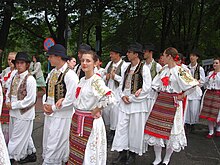
Back Култура на Унгария Bulgarian Cultura de Hungría Spanish فرهنگ در مجارستان Persian Unkarilainen kulttuuri Finnish Culture de la Hongrie French Kultura Mađarske Croatian Հունգարիայի մշակույթ Armenian Budaya Hungaria ID უნგრეთის კულტურა Georgian Kebudayaan Hungary Malay
This article needs additional citations for verification. (January 2011) |



| Part of a series on the |
| Culture of Hungary |
|---|
 |
| People |
| Languages |
| Mythology |
| Cuisine |
| Festivals |
| Religion |
| Art |
| Sport |
Hungarian culture is characterised by its distinctive cuisine, folk traditions, poetry, theatre, religious customs, music and traditional embroidered garments. Hungarian folklore traditions include tales, music, dance, decorated pottery, carvings and embroidery. Historically, Hungarian music has largely consisted of folk music and classical and baroque pieces.[1] Hungary is in southeastern Central Europe and shares cultural similarities with neighbouring Balkan countries[2][3] and Turkic nations in Asia.[4][5] Noted Hungarian authors include Sándor Márai, Imre Kertész, Péter Esterházy, Magda Szabó and János Kodolányi. Imre Kertész is particularly noteworthy for having won the Nobel Prize in Literature in 2002.
- ^ "Hungary - Daily life and social customs | Britannica". www.britannica.com. Retrieved 2022-11-14.
- ^ "Hungary's Growing Role in the Balkans". Hungary Today. 2019-07-01. Retrieved 2023-05-10.
- ^ Ács, Pál; Fodor, Pál, eds. (2020-08-10), Identity and Culture in Ottoman Hungary, De Gruyter, doi:10.1515/9783112209301, ISBN 978-3-11-220930-1, retrieved 2023-08-24
- ^ Egeresi, Zoltán (2021-11-19). "Hungary in the Organization of Turkic States: A Bridge between East and West". Anadolu Agency. Retrieved 2024-06-08.
- ^ Pető, Zoltán (2024-05-04). "The Hungarians and the Turkic Peoples: Relatives, Enemies, or Friends? | Hungarian Conservative". Hungarian Conservative. Retrieved 2024-06-08.
© MMXXIII Rich X Search. We shall prevail. All rights reserved. Rich X Search